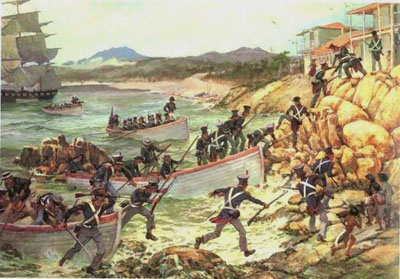Provide command, control, and administrative functions as are necessary for the discipline, morale, welfare, and academic success of personnel assigned to the Marine Corps Detachment, Defense Language Institute. Coordinate and facilitate language training for Marines attending the Defense Language Institute in order to provide linguistically-proficient Marines to the operating forces and supporting establishment.
 The Marine Corps presence in Monterey began in 1846 when the Marines of the US Pacific Squadron landed and raised the “Stars and Stripes” at the Monterey Customs House and secured California to become the 31st state in the Union.
The Marine Corps presence in Monterey began in 1846 when the Marines of the US Pacific Squadron landed and raised the “Stars and Stripes” at the Monterey Customs House and secured California to become the 31st state in the Union.
Upon the outbreak of war between Mexico and the United States on 12 May 1846, Commodore Sloat, Commander of the US Pacific Squadron was embarked aboard his flagship, the USS Savannah. When word reached him that war had been declared, he directed all ships to the California coast.
Marine Lieutenant Archibald Gillespie had already been operating in California since early 1846 under special orders from President James Polk. After supporting General Fremont and the “Bear Flag” Revolt, Lieutenant Gillespie proceeded to Monterey in June 1846 with orders for U.S. Consul, Thomas Larkin and Commodore Sloat to seize Monterey and all of California for the United States. The Savannah reached Monterey on the 2d of July where it joined the USS Cyane and USS Levant and ascertained that the USS Portsmouth was at San Francisco. On the 7th of July, 85 Marines and 165 sailors landed under the immediate command of Captain William Mervine, USN and raised the colors of the United States under a salute of twenty-one guns. The Marine Officers engaged on this occasion were Captain Ward Marston, Second Lieutenant W. A. T. Maddox, and Second Lieutenant Henry W. Queen. Orderly Sergeant John McAbe was in charge of the Levant’s Marine guard that was included in the landing. After the Pacific Squadron sailed south to take Santa Barbara, Los Angeles and San Diego, Lieutenant W. A. T. Maddox served as the Military Governor and commanded the detachment of Marines and sailors that remained in Monterey until 1847 when control was transferred to the Army. Over the next 100 years, the Marine presence in Monterey came and went with the Fleet.
World War II set into motion the events that would permanently bring the Marines back to Monterey. The war highlighted the need for skilled linguists and the first 12 Marine linguists graduated from the Navy Language School at Ft. Savage, CO in 1943. During the war, Army linguists were trained at the Presidio of San Francisco. In 1946, the Army Language School relocated to the Presidio of Monterey. By the early 1960s, the Navy/Marine and Air Force language schools re-located to Monterey and in 1963, the Army Language School, Presidio of Monterey was re-designated the Defense Language Institute (DLI).
Prior to 1974, Marines reported to the Commandant of the Defense Language Institute, West Coast Branch and were administratively assigned to Casual Company, Headquarters Battalion, Henderson Hall, Arlington, VA. On 15 June 1974, MajGen R. H. Barrow formally established Marine Corps Detachment, Presidio of Monterey. The mission was as follows: “Provide the organizational framework for effective supervision and coordination of overseas military programs. Functions include maintaining direct liaison with United States diplomatic missions and foreign defense establishment or security assistance matters and advise, assist and plan with foreign defense establishment as may be appropriate.” At that time the Detachment was comprised of approximately 120 DLI students, a small number of officers attending the Naval Postgraduate School (transferred from Annapolis to Monterey in 1951) and the Marines assigned to Joint US Military Advisor Groups around the world, to include Colombia, the Philippines, Korea, Greece and Thailand.
Since 1974, the Detachment has become the Marine Corps’ focal point for the training of officer and Marine linguists and Special Assignment Officers. These Marines go on to fill billets throughout the Fleet Marine Operating Force, Marine Special Operations Force, Supporting Establishment, Department of Defense and US Diplomatic Missions around the world and are critical to the success of our Corps and the defense of our nation.